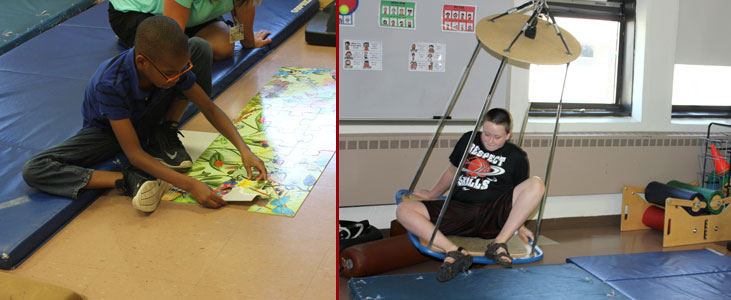Occupational Therapy

The focus of Occupational Therapy at Gateway School is to maximize our student’s ability to achieve their maximum potential in their jobs as students. This is accomplished by identifying ways to either remediate or compensate for the following issues that impact this potential in the following areas:
1
Activities of Daily Living/Self-Care Skills
Use of real life tasks that enable our students to have increased independence
- Shoe tying
- Dressing Skills
- Folding Clothes
- Making Beds
- Washing Dishes
- Hygiene Skills such as teeth brushing
- Meal Preparation
2
Gross Motor Skills
Working along with the students within their school environment to modify Physical Education, recess or activities within the community for maximum participation. Remediating deficits in areas that negatively impact gross motor skills including:
- Motor planning
- Physical endurance
- Muscle tone
- Postural/upper extremity control
- Balance and equilibrium
- Bilateral coordination
3
Fine Motor/Handwriting Skills
Working both in a therapeutic environment and in the classroom to improve areas for better use of classroom manipulatives (i.e. scissors, glue, blocks, buttons, zippers), as well as improved handwriting skills. The Handwriting Without Tears Program is utilized an effective tool that incorporates various learning styles to enhance the student’s writing abilities. Skills that are targeted can include:
- Grasp patterns
- Grading of upper extremity movement patterns
- Upper extremity strength and stability
- Scissoring skills
- Visual Perceptual skills
- Keyboarding skills
4
Sensory Modulation
The ability to sit and attend is the foundation of a student’s ability to learn and operate smoothly within their environment. When issues are present that impact their ability to self- regulate and therefore attend,sensory strategies, coupled with pull out therapy sessions, are incorporated into the classroom setting to provide needed input throughout the students day. This input can include use of heavy work, access to various types of swings, alternate forms of seating, or use of a pressure or weighted vest. These are just a small sampling as each program is designed to best fit the need of the individual child.
5
Social Skills
One of the biggest challenges for our students is the ability appropriately interact with not only peers and staff, but with people in the community. These skills are built in therapy in a variety of ways, these include: role playing, party/meal planning with peers, engaging in team building activities, and practicing in small groups. These skills are practiced in a variety of settings within the community, such as restaurants, grocery stores, the Post Office.
6
Pre-vocational/WorkSkills
As students move toward being able to become a contributing member of society abilities that are needed to be successful are met by honing the following skills:
- Organization
- Cooperative group functioning
- Speed/Accuracy
- Ability to follow a variety of directions
- Acceptance of authority
Therapy services are given in individual, group, as well as integrated classroom sessions, depending on the need of the student.


